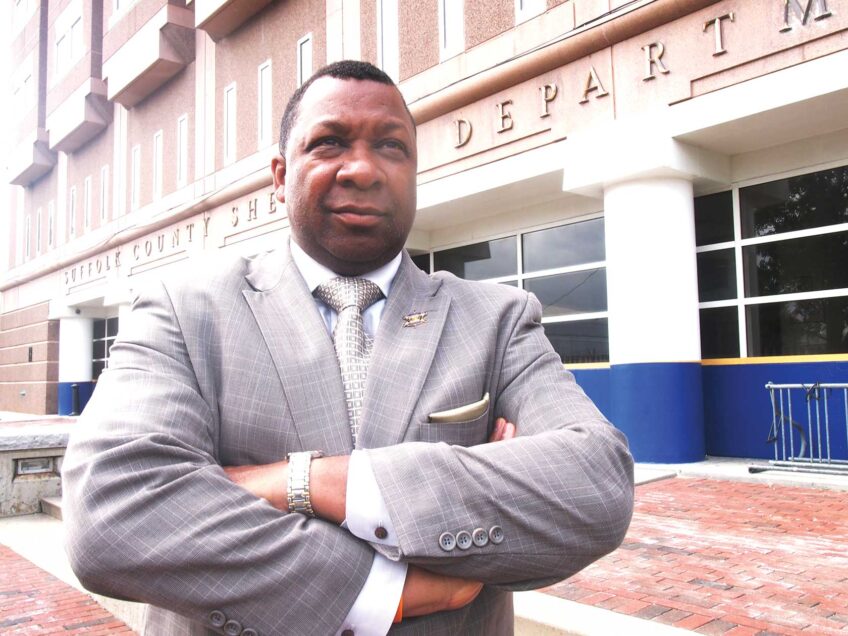When homeowners moved into the Harvard Commons development in Dorchester years ago, they embraced the residential neighborhood and its private thoroughfares. Now, the initiation of a betterment project has homeowners considering the possibility of their private ways becoming public streets.
In recent weeks, however, a dispute over the costs of the conversion ensued, with some residents questioning the upfront cost for which they would supposedly be responsible should the private ways become public.
More than 50 single-family homes, laid out along curving lanes named for state Sen. Royal Bolling and the Snowden family near the intersection of American Legion Highway and Morton Street, make up the development, which opened around the turn of the millennium.
Uncertainty around the conversion is complicated by questions around whether the city’s Public Improvement Commission (PIC), which manages Boston’s private and public rights of way, acted properly and whether the contractor who developed the complex, Cruz Development Corporation, is living up to its obligation to finance some of the improvements.
Those questions have now resulted in a lawsuit against the PIC and Cruz Development Corporation. Four homeowners named as plaintiffs said they seek the Massachusetts Land Court’s ruling on whether Cruz, which has offered to pay half the conversion costs, is required to make all the improvements to curbs, sidewalks, streetlights and other roadway infrastructure before the streets become public.
Homeowners were set to vote on the conversion at a March 4 public hearing but received an email from Todd Liming, chief engineer at the PIC, stating that the vote had to be delayed due to the lawsuit. The conversion decision appears to be headed for a vote by residents sometime in April.
If the streets stay private, homeowners will be responsible for maintaining their streets once they inevitably deteriorate. They will also have to pay for other road services such as cleaning, repairs and snow plowing, except in emergencies. Homeowners have not had to pay for these services to date as Cruz Development Corporation still owns the roadways.
If homeowners vote to move forward with the conversion, each property owner will have to pay an amount based on their property size, called an assessment, to cover some of the construction costs. Estimates of those assessments range from roughly $5,000 for smaller lots to over $10,000, according to homeowners and other sources. Cruz Development Corporation said Tuesday that the city was working on a plan to cut those costs to homeowners by 45%. In addition, Cruz will put in as much as $300,000 of their own money into the conversion.
To pay off their own assessment, homeowners can pay upfront or spread payments over 10 to 20 years. According to an analysis by Cruz, the average homeowner’s cost would be just under $4,000 and, financed over 20 years, would result in monthly payments of about $12.
In either case, until the homeowners pay off the amount, interest will accrue, and the city will place liens on their homes.
Aalana Feaster, a Harvard Commons homeowner and plaintiff in the lawsuit, said she has not thought about the conversion because she wants more time to understand its consequences. She worries that the liens will affect homeowners’ credit, their ability to sell their homes and their refinancing options on properties that have increased in value by hundreds of thousands of dollars in Boston’s hot housing market.
A few weeks ago, she said she wanted the public improvements commission to delay the March 4 vote, adding that it was “premature” and didn’t give homeowners enough time to understand if and why they would have to pay for the conversion.
“Those of us who filed the lawsuit are saying these are not our costs … to pay now, and they will not be our construction costs to pay in five years,” Feaster said.
The PIC said it would not comment on this pending legal matter. But in a recording from a Jan. 29 neighborhood meeting, Liming said if Harvard Commons homeowners vote to stay private, they will not have a chance to vote on the matter again for another five years. At that point, the conversion could potentially be more expensive.
Jessica Spruill, whose husband is a plaintiff, said it was “mind-boggling” to her that the city would place a lien on their home. She believes, like Feaster, that she is not responsible for the construction costs.
Mark Koeck, a Harvard Commons homeowner of five years, said he and his husband intend to vote for public streets, adding that the assessment was “an insurance policy against future financial risks.”
Their estimated portion of the bill is $13,000, which Koeck called unfair, but said he and his husband want to “mitigate our exposure to financial risk when future repairs are needed or should liability issues arise.”
State Rep. Russell E. Holmes, who represents the 6th Suffolk district, said he believes it’s wise for homeowners to vote now and lock in the best price. If the streets become public, the city will take responsibility for future repairs, plowing and any subsequent costs.
Despite the potential upsides, some in Harvard Commons still strongly oppose the conversion.
Spruill said she is concerned that making the streets public would worsen an already bad situation.
“I get that it’s a private road and people can walk the private road,” she said. “But [there are things] that are going on in the development that I did not see happening when I first moved in there. You have people loitering and hanging out and smoking and drinking, [and] parked cars in front of people’s homes.”
Holmes says he would like Harvard Commons to be more unified.
“As a state rep, I want a community,” he said. “I want the doctor to be able to live next to the person who is in affordable housing and to have those kids grow up together and not have it so that these folks are separated from one another.”
In a statement, Cruz Development Corporation said it understood the concerns of homeowners and would commit over $300,000 “plus the time and personnel to effect the process.” Cruz also said that it reduced the estimated cost for the required work by one-third.
“If the choice is to convert to public streets, Cruz Development Corp. would bear its share, about 50% of the cost of the work,” said the statement, adding that the company will abide by the homeowners’ choice, wherever it lands.
Harvard Commons residents include a Cruz maintenance director and a company manager, “giving us a close perspective on community needs,” the company said.






